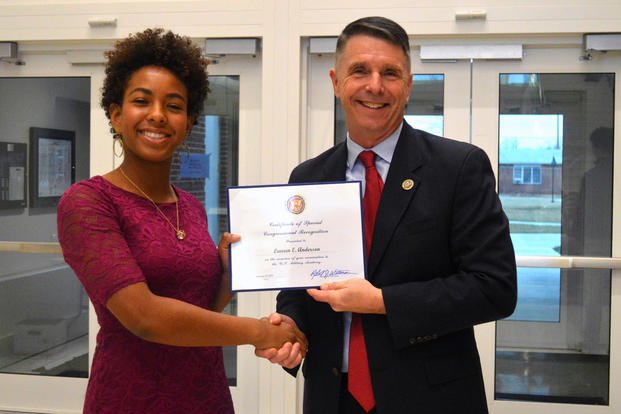It's a part of lawmakers' jobs not shown on C-SPAN or highlighted in a 30-second campaign ad.
It's unlike almost anything else in politics -- endorsed by both Democrats and Republicans and devoid of controversy. The annual ritual in which U.S. representatives and senators submit their nominations to the military service academies is embraced with a level of appreciation befitting its responsibility.
"They have staffers specifically [assigned to this duty]; that's one of their roles,'' said Army Col. Debbie McDonald, director of admissions at West Point. "Many of them say one of their most cherished roles is to work with their constituents to try to gain them entry into the service academies.''
As mandated by Title 10, Statute 4342, of the United States Code, "Each senator, representative and delegate in Congress, including the resident commissioner from Puerto Rico, is entitled to nominate 10 persons for each vacancy that is available to him under this section.''
Service academy nominations are allowed from other sources as well, including the president, U.S. territories, service secretaries and service academy superintendents.
How the Service Academy Nomination Process Works
Members of Congress typically have a link on their website for academy nominations, which are mandatory for the U.S. Military Academy, Naval Academy, Air Force Academy and Merchant Marine Academy. The Coast Guard Academy, part of the Department of Homeland Security, does not require a congressional nomination.
Related: Are You Eligible to Join the Military?
"Most of them run a very similar process, which includes opening up the application typically in the summer between a student's junior and senior year [of high school],'' said Melody Hwang, director of nominations and appointments at the Naval Academy. "Typically, the application requests very similar documents that any college application would require -- for example, SAT or ACT scores, teacher recommendation letters, transcripts, résumés etc. -- and then most of the offices also conduct an interview for the applicants after reviewing the applications.''
Eligible applicants must be at least 17 years old but not past their 23rd birthday (25 for the Merchant Marine), a U.S. citizen and a permanent resident of the state in which they are requesting a nomination. They also must be unmarried, not pregnant and without legal obligation to any dependents. Applicants can apply to more than one service academy, increasing their chances of receiving a nomination.
Applicants may receive nominations from either U.S. senator in their state of legal residence, the U.S. representative from their specific district or the vice president, who is allowed five at-large selections. A congressional member may have no more than five nominees attending a particular academy at any time.
Most lawmakers usually are allocated at least one open position annually. Nominations are due by Jan. 31.
Related: Join the Military
"Sometimes, there's extenuating circumstances that may extend that,'' McDonald said. "It's rare where we don't receive the nominations by that deadline, but we do work with the nominating sources if there's floods, fires, COVID, anything like that that somehow delays the selection process. We work closely with them, and then we don't let that disenfranchise those candidates within that district.''
How to Nail the Service Academy Nomination Interview
Congressional offices usually form a panel to decide on nominees. This process bears a remarkable similarity to a job interview but not one to which a typical teenager might be accustomed. This isn't like heading down to the local fast food joint to check out that position flipping burgers for the summer.
"Dress appropriately,'' McDonald said. "Be knowledgeable about current affairs and world events. And we recognize that they might be nervous, but that's OK. Just be themselves and express why they're interested in attending the service academy.''
McDonald and Hwang provided other advice, such as:
- Don't procrastinate. Apply as early as you can and make sure you have the necessary paperwork.
- Inquire whether your representative or senator holds a military academy night, which provides a quick fix for information about the process and helpful tips.
- Keep the lines of communication open with congressional staffers assigned to oversee academy nominations.
- Consider applying for a congressional internship. Associating a name with a friendly face never hurts.
"[Anything] that would kind of make them stick out in the normal college admissions world is typically what the nominations panel is also seeking,'' Hwang said. "Their desire to serve the nation. Their desire to attend one of the military service academies. Those are the types of questions that the panel will ask. So their involvement in ROTC at their high school [is important] -- anything that shows that they're actually passionate about attending one of the service academies and not just applying because Mom or Dad is making them apply.''
And at the very least, take solace in one fact: C-SPAN's cameras won't be rolling.
Interested in Joining the Military?
We can put you in touch with recruiters from the different military branches. Learn about the benefits of serving your country, paying for school, military career paths, and more: sign up now and hear from a recruiter near you.















